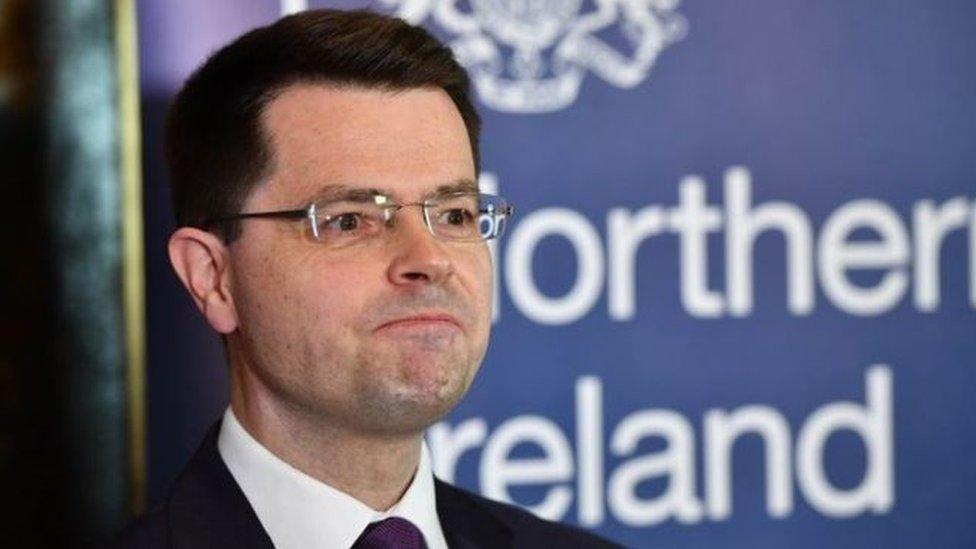DUP deals and dialogue: where are we now?
- Published

The DUP met with the Conservative Party's chief whip Gavin Williamson on Saturday
Don't be surprised if things go quiet today so far as the DUP-Conservative discussions are concerned.
Not all DUP politicians are Sabbatarians, but enough are to make it party policy to avoid being seen to negotiate on a Sunday.
It was no coincidence that a DUP statement effectively denying that any final deal with Theresa May had been reached was published at midnight exactly, not one minute past.
As UK voters try to find out what the DUP stands for, there's been an understandable emphasis on their opposition to abortion and same-sex marriage and the outspoken views of some of their representatives denying man made climate change or espousing creationism.
However, as the former DUP minister Alastair Ross pointed out on BBC Radio 5 Live on Sunday, the party encompasses a range of views on these issues.
The DUP: Partners in government
So far as the discussions with Theresa May are concerned, the moral arguments are likely to be a red herring, even though they create an uncomfortable backdrop for many more liberal-minded Tories.
Instead the DUP will concentrate on bread and butter politics.
That means inward investment in Northern Ireland and more local infrastructure spending.
Although to the right on many moral questions, the DUP's economic approach is populist.

The DUP leader Arlene Foster and Deputy leader Nigel Dodds celebrated electoral success after securing 10 seats at Westminster
Many of its 292,000 voters are working class, so the party opposed the Conservative welfare benefit cuts and its most recent manifesto includes a pledge to defend the triple lock on pensions and the winter fuel allowance.
Expect it to push these arguments.
DUP MPs were some of the most enthusiastic Brexiteers. But when it comes to its practical implementation, the DUP leader Arlene Foster signed a joint letter with the late Martin McGuinness which put her very much on the soft end of the Brexit spectrum.
This included a call for flexibility on the Irish border, ease of trade with EU member states and access to both unskilled and highly skilled European labour.
Power sharing
Since the DUP-Conservative discussions began, some senior Labour figures involved in the peace process such as former Northern Ireland Secretaries Lord Peter Hain and Shaun Woodward, have expressed concern that Mrs May is abandoning the "rigorous impartiality" which both the British and Irish governments signed up to in the 1998 Good Friday Agreement, external.
Their argument is that this will undermine any attempts to restore the power-sharing executive at Stormont, which collapsed at the start of the year as a result of a row over a controversial and expensive renewable heating scheme.
Prior to the election, the Northern Ireland Secretary James Brokenshire was already facing criticism from Irish nationalists about his alleged lack of impartiality regarding dealing with the legacy of Northern Ireland's troubles.
That led to a senior civil servant taking over the chairing of much of the talks.
But Conservatives argue there's nothing in the Good Friday Agreement which says they can't be in favour of maintaining the UK.

Secretary of State James Brokenshire faced criticism from nationalists about his approach to legacy issues
David Cameron frequently declared he was a "passionate unionist" and in a failed electoral experiment even stood joint candidates with Northern Ireland's smaller unionist party, the Ulster Unionists, back in 2010.
The latest rapprochement with the DUP to some extent continues that approach.
Sinn Féin has accused the DUP of betraying the people of Northern Ireland by propping up the Tories and predicted any arrangement "will be transitory and end in tears".
If the DUP shopping list contains items like changing the current definition of a troubles victim (which includes perpetrators) or protecting army veterans and former police officers from prosecution for troubles offences, that will seriously annoy republicans.
But more funding to blunt the local impact of Brexit might be appreciated across the board.
How long any deal will last has to be open to question. But expect the DUP to be canny and to enjoy their moment in the sun.
After endless rounds of talks, if there's one thing Northern Ireland politicians know all about it's how to negotiate.